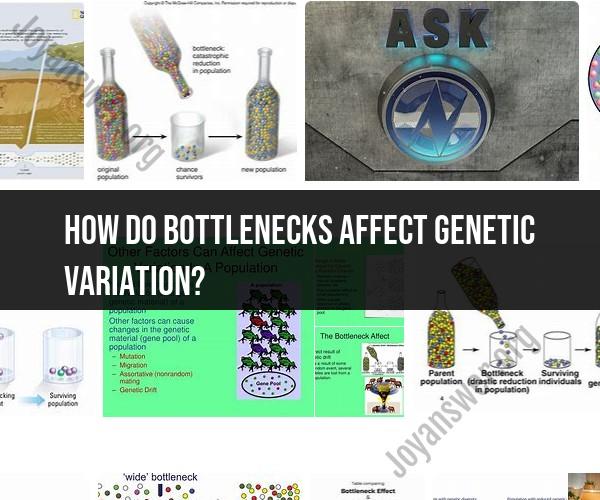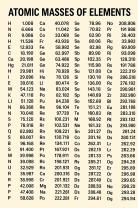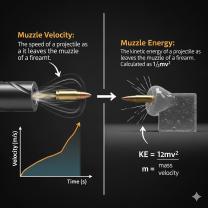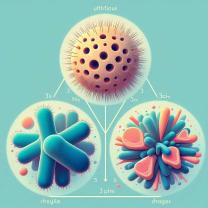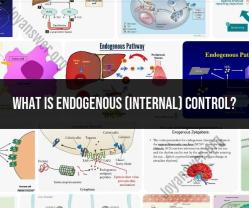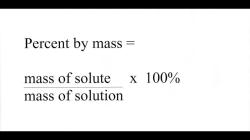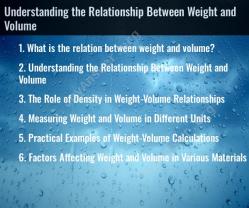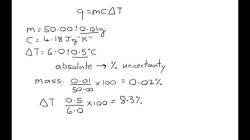How do bottlenecks affect genetic variation?
Bottlenecks, in the context of population genetics, have a significant impact on genetic variation within a population. A bottleneck occurs when a population undergoes a drastic reduction in size, often due to a sudden and catastrophic event. This reduction in population size can lead to several genetic consequences:
Loss of Genetic Diversity: The most immediate and noticeable effect of a bottleneck is the loss of genetic diversity within the population. With fewer individuals surviving the bottleneck, many alleles (different versions of genes) can be lost from the gene pool. This results in a population that is genetically less diverse than before the bottleneck.
Increased Genetic Drift: Genetic drift is the random fluctuation of allele frequencies over time due to chance events. In small populations, such as those resulting from bottlenecks, genetic drift becomes more pronounced. As a result, alleles can become fixed (where only one allele remains) or lost more quickly due to random chance, regardless of their fitness.
Founder Effect: If a small subset of individuals survives the bottleneck and goes on to establish a new population, this subset carries only a fraction of the genetic diversity of the original population. This phenomenon is known as the founder effect. As a result, the new population may have a different genetic makeup than the original population.
Loss of Rare Alleles: Rare alleles, which may have been present in the original population but were not common, are particularly vulnerable to being lost during a bottleneck. This can reduce the overall genetic variation in the population.
Increased Homozygosity: Homozygosity refers to the presence of two identical alleles at a particular gene locus. Bottlenecks can increase the frequency of homozygous individuals within the population, reducing heterozygosity (the presence of two different alleles). This can make the population more susceptible to the expression of recessive genetic disorders.
Reduced Adaptive Potential: A reduction in genetic diversity can limit a population's ability to adapt to changing environmental conditions. With fewer genetic options to draw upon, the population may struggle to evolve traits that are advantageous in new or challenging environments.
Loss of Traits: If alleles associated with certain traits are lost during a bottleneck, the corresponding traits may disappear from the population altogether. This can result in the permanent loss of specific genetic traits.
It's important to note that the genetic consequences of a bottleneck can persist for generations, even after the population size increases. The loss of genetic diversity during a bottleneck can have long-term implications for the population's ability to evolve and adapt to changing conditions.
In conservation biology, understanding the genetic impact of bottlenecks is crucial for managing endangered species and populations. Strategies such as genetic rescue, where individuals from genetically diverse populations are introduced to bottlenecked populations, can help mitigate the negative effects of reduced genetic diversity.
Genetic Variation and Bottlenecks: Understanding the Impact
Genetic variation is the difference in genes between individuals within a population. It is important for the survival of a population because it allows the population to adapt to changes in the environment.
A bottleneck is a reduction in the size of a population. Bottlenecks can be caused by a variety of factors, such as natural disasters, habitat loss, and hunting.
Bottlenecks can have a significant impact on genetic variation. When a population goes through a bottleneck, the number of alleles (different forms of a gene) in the population is reduced. This is because only a small number of individuals survive the bottleneck, and these individuals may not carry all of the alleles that were present in the original population.
Bottlenecks and Genetic Diversity: How They Shape Populations
Bottlenecks can reduce genetic diversity in a population in a number of ways. First, they can lead to the loss of alleles. Second, they can lead to an increase in the frequency of certain alleles, which can make the population more vulnerable to disease. Third, they can lead to inbreeding, which can increase the risk of genetic defects.
The impact of a bottleneck on a population will depend on a number of factors, such as the severity of the bottleneck and the size of the population before the bottleneck. For example, a small population that experiences a severe bottleneck will be more likely to lose genetic diversity than a large population that experiences a mild bottleneck.
Genetics in a Squeeze: The Effects of Bottlenecks on Variation
Bottlenecks can have a number of negative consequences for populations. For example, they can make populations more vulnerable to disease and extinction. Bottlenecks can also reduce the ability of populations to adapt to changes in the environment.
However, bottlenecks can also have some positive effects on populations. For example, they can lead to the emergence of new genetic combinations that can give the population an advantage in certain environments. Bottlenecks can also lead to a decrease in the number of harmful alleles in a population.
Conclusion
Bottlenecks are a powerful force in evolution. They can have a significant impact on the genetic variation and diversity of populations. Bottlenecks can be caused by a variety of factors, and their impact on populations will depend on a number of factors, such as the severity of the bottleneck and the size of the population before the bottleneck.
